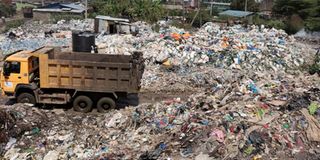On plastic pollution, technology our only way out

The Dandora dumpsite. Scientists have come up with a model to help reduce the plastic pollution problem by 2040.
What you need to know:
- Study shows said other interventions such as recycling cannot sufficiently help in solving the problem
- Researchers ward that the rate of macro and micro plastics finding their way into water bodies has gone up
The world’s plastic pollution problem could be solved by 2040 if technology and scientific knowledge will be implemented.
This positive outcome on plastics and the environment was published in a new study in the journal Science. The researchers based their timeline on a System Change Scenario that predicts both land and water pollution caused by plastic to reduce by 78 per cent. It said other interventions that had been in place such as recycling, reducing demand or collecting of plastic cannot sufficiently help in solving the problem.
It is the technology that the researchers vouch for.
Global action
However, the study warned that the rate of macro and micro plastics finding their way into water bodies from land has gone high 2.6 fold. On land, there had been an increase in environmental pollution affected by plastics alone, which was 2.8 fold.
The scientists, however, came up with a model to help reduce the plastic pollution problem by 2040. “When we modelled current commitments to reducing plastic pollution assuming full implementation, annual plastic pollution rates into aquatic and terrestrial environments decreased by only 6.6 per cent and 7.7 per cent by 2040, respectively,” said the researchers.
“This result not only confirms that current commitments coupled with appropriate policies can reduce plastic waste input into the environment but also shows that additional effort will be needed to match the unprecedented scale of projected environmental plastic pollution,” it said.
The scientists called for global action to stop plastic pollution. “Coordinated global action is urgently needed to reduce plastic consumption; increase rates of reuse, waste collection, and recycling; expand safe disposal systems; and accelerate innovation in the plastic value chain,” said the research.
Supposing the interventions suggested will be delayed, in five years, more plastic waste is expected to accumulate in the environment.



